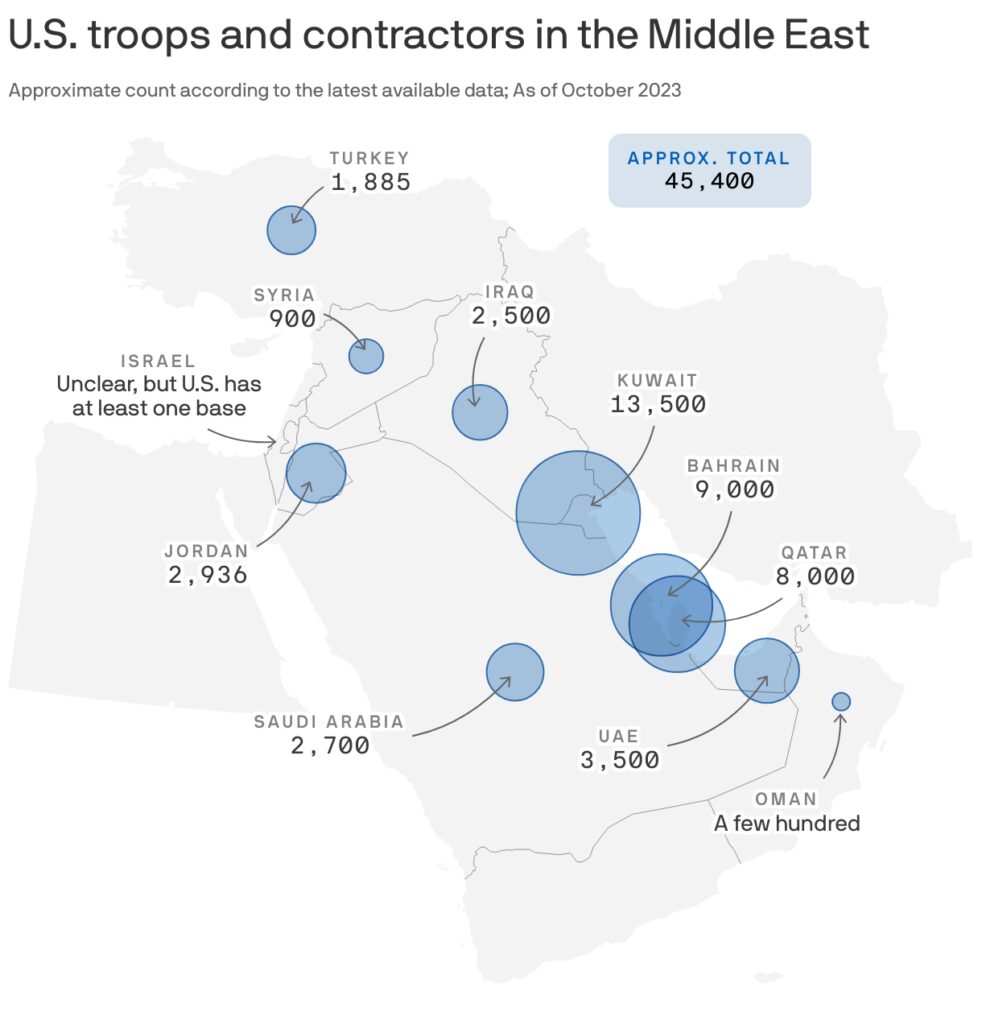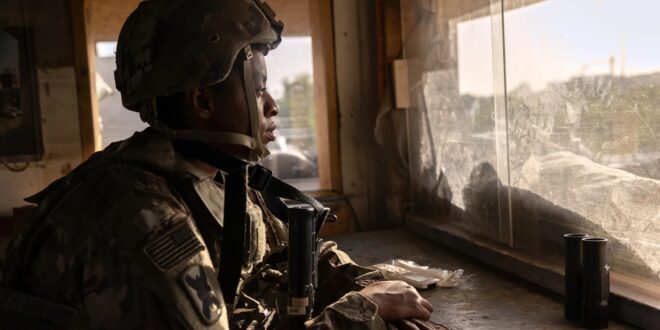With the Israel-Hamas war escalating, the United States risks becoming involved in a larger conflict that could entangle some of the more than 40,000 U.S. military personnel based across the region.
Why it matters: U.S. troops and military contractors in Iraq and Syria have been targeted in over a dozen attacks by Iranian-backed militia groups since Hamas’ surprise attack against Israeli civilians and soldiers on Oct. 7.
- Defense Secretary Lloyd Austin has warned of the “prospect of a significant escalation of attacks on our troops and our people throughout the region.”
- Between the lines: The attacks, as well as a wider war, could reverse efforts in recent years to reduce the U.S. presence in the Middle East as part of a strategic pivot to toward the Pacific.

Troops on the move
The Department of Defense has dispatched or prepared for deployment thousands of personnel.
Those include two aircraft carrier groups with roughly 7,500 personnel each and two amphibious Navy ships carrying thousands of Marines.
Another ship, the USS Carney, intercepted three missiles over the Red Sea that were "potentially" aimed at targets in Israel.
Austin also placed approximately 2,000 personnel on a heightened state of readiness.State of play: The troops being sent to the region are not expected to serve in combat roles, though the White House has discussed the possibility of using military force if Lebanon-based Hezbollah opens a new front in the war, Axios’ Barak Ravid first reported.
Troops under fire: Iraq and Syria
Personnel at a U.S. military outpost in Syria have been targeted by at least three drone and missile attacks, while rocket and drone attacks have targeted U.S. personnel based in Iraq at least 10 times since Oct. 17, per the Pentagon.
No U.S. soldiers have been killed, but at least 21 suffered what the DoD described as minor injuries.Syria: Approximately 900 soldiers are in Syria to conduct counterterrorism operations against ISIS.
Approximately 100 of those are supporting the Free Syrian Army, a coalition of opposition militias in the ongoing Syrian civil war.Iraq: DoD has not publicly disclosed exactly how many soldiers are in Iraq, but it said in 2021 that the number of personnel dropped to 2,500.
U.S. and Iraqi officials in July 2021 agreed to shift the U.S. military presence in the country to a purely non-combat advisory role, marking the official end of the U.S. combat mission there.
Soldiers now train and advise Iraqi Armed Forces and provide intelligence in their ongoing fight against ISIS.Troops in Israel and Jordan
Israel: It’s unclear how many U.S. troops are based in Israel, but the U.S. maintains at least one military base in the country.
The classified base, code-named "Site 512," is believed to house a radar surveillance system that can detect and track ballistic missile threats against the U.S.Jordan: Though the presence of the U.S. military is a sensitive domestic issue in Jordanian politics, there were around 2,900 personnel there as of June 2023 at the request of the Jordanian government.
They were deployed there to support Jordan's operations against ISIS, to enhance its security and to promote regional stability.
Jordanian air bases, particularly, have been important for U.S. intelligence missions in Syria and Iraq.Qatar hosts U.S. troops and Hamas leaders
Qatar: As another major non-NATO ally, Qatar is crucial to the U.S.’ military strategy in the region.
At least 8,000 U.S. forces are deployed to the large Al Udeid Air Base southwest of Doha, which hosts the regional headquarters for U.S. Central Command.
The air base is the U.S.' largest military installation in the Middle East, though it also houses Qatar's air force and air forces from other countries, including the U.K.The flipside: Qatar has also allowed a Hamas political office to operate in Doha for over a decade. It houses several high-ranking Hamas officials, including the organization’s supreme leader, Ismail Haniyeh.
Qatar has been heavily criticized for hosting the office, but it maintains that doing so allows it to mediate relations with Hamas and the West and may help foster Israeli-Palestinian peace.
However, U.S. officials recently said Qatar may be open to reconsidering Hamas' presence in the country once the more than 200 hostages captured by the by the Palestinian militant group are freed, according to the Washington Post.Major hubs in the Gulf and Turkey
Bahrain: As of 2022, there were over 9,000 U.S. military personnel assigned to NSA Bahrain, a U.S. naval base that is the headquarters of the U.S. Naval Forces Central Command and the U.S. Fifth Fleet.
It is the U.S.' only permanent shore naval base in the Middle East and Bahrain's Khalifa bin Salman Port is one of the few facilities in the Gulf that can accommodate U.S. aircraft carriers and amphibious ships.
Bahrain, too, has been designated a major non-NATO ally, allowing it to purchase certain arms and conduct defense research with the U.S.Kuwait: Thousands of U.S. forces have been stationed in Kuwait since 1991 when a multinational coalition led by the U.S. expelled Iraqi forces from the country as part of the first Gulf War.
- The country also served a major logistics base for U.S. and coalition forces during the Iraq War.
- In 2021, there were 13,500 U.S. personnel and thousands of pieces of equipment in Kuwait, primarily at Camp Arifjan and Ali al-Salem Air Base.
- The country, which is a major non-NATO ally, also hosts thousands of German, Japanese and South Korean troops.
Saudi Arabia: In December 2022, there were over 2,700 U.S. troops stationed in Saudi Arabia to train, advise and assist its armed forces and to protect U.S. interests in the region from Iran and its proxies.
The soldiers there maintain air and missile defense systems and support the operation of military aircraft, according to the White House.
Worth noting: The Biden administration in 2021 ended U.S. support for Saudi Arabia's offensive operations against the Yemen-based and Iran-back Houthi rebels, though the U.S. still provides defensive support.United Arab Emirates: The UAE has been a key U.S. ally in the Middle East for years, hosting up to 3,500 U.S. personnel.
They are primarily based at Al Dhafra Air Base, which holds the Gulf Air Warfare Center — a regional air and missile defense training hub jointly operated by the UAE and the U.S.
The country's ports are also critical for the U.S. Navy, as they collectively host more ships than any other port outside the U.S.Oman: There are a few hundred troops stationed in Oman, primarily from the Air Force.
The country allows the Air Force to conduct thousands of overflights and hundreds of landings each year, while U.S. vessels are able to make 80 port calls annually. Port access was expanded in 2019.
Earlier this year, the U.S. transferred an additional destroyer and fighter jets near Oman in response to the Iranian Navy seizing merchant vessels in the Strait of Hormuz and the Gulf of Oman. Turkey: The U.S. has over 1,000 troops in Turkey — a NATO member — primarily at an air base near the city of Adana and an air station near Izmir.
 Eurasia Press & News
Eurasia Press & News




